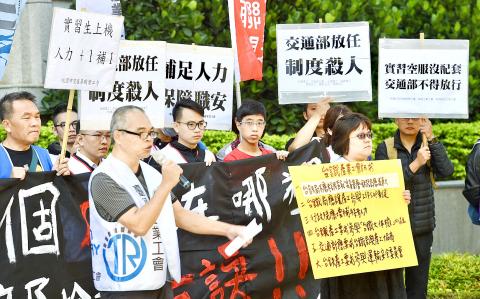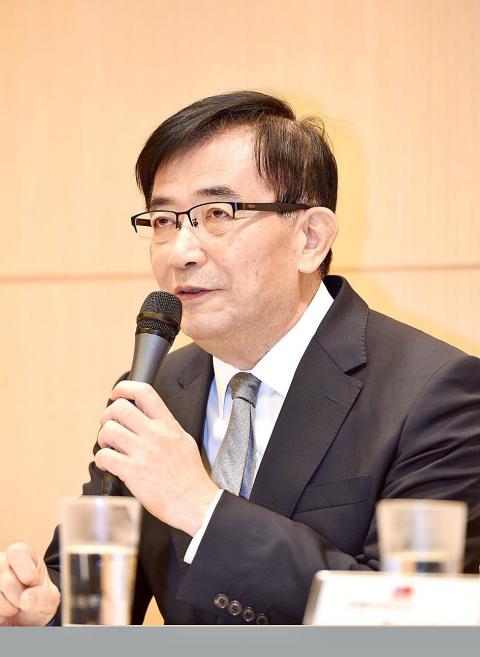The Executive Yuan yesterday announced that Deputy Minister of Transportation and Communications (MOTC) Chang Cheng-yuan (張政源) is stepping down to assume the post of Taiwan Railways Administration (TRA) director-general.
The change — effectively a demotion from a deputy minister to an agency director — is part of the government’s efforts to reform the TRA following a derailment on Oct. 21 that killed 18 passengers and injured 190.
Chang used to work at the TRA and is now returning to the railway agency to reform it after serving in the second-highest position at the ministry, the Executive Yuan said, adding that he does not carry the “baggage” of the TRA, despite being a former TRA employee.

Photo: Peter Lo, Taipei Times
“The ministry originally considered allowing Chang to serve as acting TRA director-general while maintaining his position as deputy minister, but doing so would contravene regulations governing the appointment of government personnel,” the Executive Yuan said in a statement.
However, Chang does not mind taking on a lower position and being paid a lower salary, the statement said, adding that he has resigned as deputy minister to become the TRA director-general.
“We thank him for accepting this commission voluntarily and hope that he can successfully implement reforms at the TRA,” it said.

Photo: Peter Lo, Taipei Times
With a doctoral degree from National Chiao Tung University’s Department of Transportation and Logistics Management, Chang was the station master at the Taipei Railway Station from 1987 to 1991.
He also served as tourism division director at the Taipei Economic and Cultural Office in New York and Tainan Bureau of Transportation chief during Premier William Lai’s (賴清德) tenure as city mayor and was later promoted to Tainan deputy mayor.
MOTC Minister Wu Hong-mo (吳宏謀) told a news conference that the ministry had asked Chang his opinion about leading the TRA.
“He was very passionate about it and said that he was capable of doing the job. As the TRA’s operations are now under heavy public scrutiny after the accident, we decided to choose someone from a higher official to handle this matter,” Wu said.
Speaking about the TRA’s reforms, Wu said that 1,907 of the 2,818 job vacancies approved by the Executive Yuan have been filled, some of whom are undergoing training for their new jobs.
An estimated 3,000 new employees would be added to the workforce in two years, Wu said.
The ministry would also utilize the funds from the annual budget allocated to the TRA as well as from the Forward-Looking Infrastructure Development Program to reduce operational risk on certain railway sections, including those that sharp curves or that are frequently damaged by landslides, Wu said.
Regarding standard operating procedures for deactivating the automatic train protection (ATP) system — a device that ensures train drivers stay within the speed limit set for each section — Wu said that the TRA does not have clear regulations on the speed limit when the ATP is turned off.
“Until the agency issues clear regulations on this matter, Puyuma Express and Taroko Express trains are to have two train drivers on board instead of one,” Wu said, adding that the change would take effect today.
Chang was yesterday in Taitung to meet with relatives of those who died in the train derailment when the Executive Yuan announced his appointment.
He later said in an interview with local media that an ad hoc task force is now stationed in Taitung to help injured passengers with their medical treatment and families of the deceased with funeral arrangements.
The task force would also assist the families in seeking compensation from the TRA, he said.
Chang vowed to help boost TRA employees’ morale and to ensure that the agency strictly adheres to safety procedures.
He said he would also help the TRA regain the public’s trust and respect.
President Tsai Ing-wen (蔡英文) and the premier have vowed to find the cause of the accident, Chang said, adding that he hoped the public would support the TRA and give it more encouragement.
The ministry’s promise was met with doubts from members of Taiwan Railway Union.
“It does not matter who the new TRA director-general is going to be if the agency keeps rejecting reforms,” union secretary Hsiao Nung-yu (蕭農瑀) said.

The CIA has a message for Chinese government officials worried about their place in Chinese President Xi Jinping’s (習近平) government: Come work with us. The agency released two Mandarin-language videos on social media on Thursday inviting disgruntled officials to contact the CIA. The recruitment videos posted on YouTube and X racked up more than 5 million views combined in their first day. The outreach comes as CIA Director John Ratcliffe has vowed to boost the agency’s use of intelligence from human sources and its focus on China, which has recently targeted US officials with its own espionage operations. The videos are “aimed at

STEADFAST FRIEND: The bills encourage increased Taiwan-US engagement and address China’s distortion of UN Resolution 2758 to isolate Taiwan internationally The Presidential Office yesterday thanked the US House of Representatives for unanimously passing two Taiwan-related bills highlighting its solid support for Taiwan’s democracy and global participation, and for deepening bilateral relations. One of the bills, the Taiwan Assurance Implementation Act, requires the US Department of State to periodically review its guidelines for engagement with Taiwan, and report to the US Congress on the guidelines and plans to lift self-imposed limitations on US-Taiwan engagement. The other bill is the Taiwan International Solidarity Act, which clarifies that UN Resolution 2758 does not address the issue of the representation of Taiwan or its people in

US Indo-Pacific Commander Admiral Samuel Paparo on Friday expressed concern over the rate at which China is diversifying its military exercises, the Financial Times (FT) reported on Saturday. “The rates of change on the depth and breadth of their exercises is the one non-linear effect that I’ve seen in the last year that wakes me up at night or keeps me up at night,” Paparo was quoted by FT as saying while attending the annual Sedona Forum at the McCain Institute in Arizona. Paparo also expressed concern over the speed with which China was expanding its military. While the US

SHIFT: Taiwan’s better-than-expected first-quarter GDP and signs of weakness in the US have driven global capital back to emerging markets, the central bank head said The central bank yesterday blamed market speculation for the steep rise in the local currency, and urged exporters and financial institutions to stay calm and stop panic sell-offs to avoid hurting their own profitability. The nation’s top monetary policymaker said that it would step in, if necessary, to maintain order and stability in the foreign exchange market. The remarks came as the NT dollar yesterday closed up NT$0.919 to NT$30.145 against the US dollar in Taipei trading, after rising as high as NT$29.59 in intraday trading. The local currency has surged 5.85 percent against the greenback over the past two sessions, central